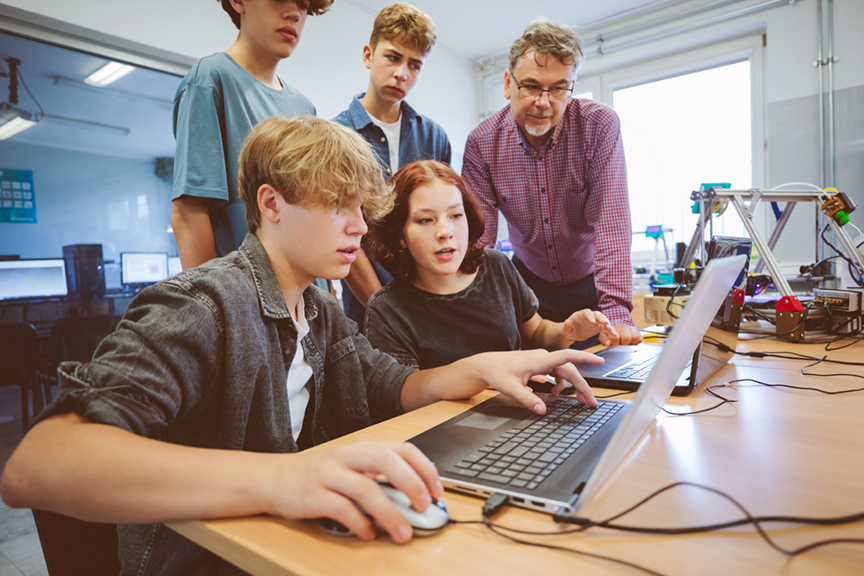
Conduct a waste audit to change behaviour.
As part of Manitoba Waste Reduction Week in October, the class participated in Waste Reduction Week Bingo | Simply Recycle.ca and Can You Recycle This? | Educational Recycling Quiz | Recycle Smart MA. The class used this bingo and the quiz as a jumping-off point to consider their own and the school’s waste habits to see if they could make some positive changes.
Learners began the project by completing a waste audit for the school. As a class, they determined the locations in the school where waste would be created (cafeteria, gymnasium, classrooms, and office) and, with the help of the custodian, developed a plan to examine and catalogue the waste into reusable, recyclable, compostable, and landfill categories, using Manitoba’s Recyclepedia website. They split into groups to organize and catalogue the garbage. They weighed each category from each location and documented their findings in a shared document with the class. They also made lists of garbage in each waste category and shared that in the class database. At the end of the audit, the learners determined the percentage of waste coming from each category, the largest contributors to waste, and the largest misplaced waste items (those in the garbage that could be recycled, for example).
As a class, the learners discussed their observations and findings. Using a variation of the Imagine if protocol (Project Zero Thinking Routines), they asked the following questions of the group:
Each group determined a plan of action to reduce waste and change behaviour for a specific audience. The deliverables of the project were the plan, a pitch of the plan to the teacher or principal for feedback, a communication tool for their specific audience, and feedback on communication from their intended audience.
Then the learners met to create group norms and each group developed their plan. After determining their audience, their goals (many returned to ideas from the reduction bingo and others developed their own ideas), and method of communication, each group created a group contract using protocols from How to Create More Meaningful Team Contracts | PBLWorks. As a group, they set goals for each day and reflected on them at the end of each day to help keep them on track.
As a class, learners discussed the needs of their audience to better understand how language, use of visuals, and modes of communication might change as their audience changed. They examined three different examples of media campaigns aimed at Early and Middle Years learners, Senior Years learners, older adults, as well as EAL learners, to analyze context cues and conventions for these audiences. The teacher set up centres for the learners to learn about how different context cues and conventions would impact their message. The centres focused on text features, elements of effective speeches, and impactful use of images. The learners individually chose a minimum of two of the centres that were most important for their plan and added notes from these centres to their criteria checklists. They used these criteria checklists to ensure they were meeting the requirements of the assignment, and each group partnered with another group for feedback.
The final communications were quite varied. One group decided to reduce paper waste in the school. They created a presentation for other classes to show how much paper was being wasted in the school. Then, they made a plan for “good one-side paper,” including how to organize and reuse it; they created mini-signs next to the garbage and recycle bins to alert learners to make different choices; and they advocated to their principal to start a composting program that allowed paper to be included.
Another group used all the reusable materials in the garbage and created an art piece for the main hallway with an artist statement explaining the piece and a pamphlet with suggestions to reduce waste next to the art piece. Other groups created social media campaigns to reduce paper use, and yet others created lessons for Grade 1 and 2 learners to teach them about garbage.
At the close of the project, the class discussed how their words and actions shaped their identity as a class and as individuals. Each learner reflected on their impact to change their own waste management practices, set individual goals to improve them even further, and advocated for others to do so.
Derian, John. How to Create More Meaningful Team Contracts. PBLWorks, 2019.
Multi-Material Stewardship Manitoba. Waste Reduction Week Bingo. Simply Recycle.ca, 2024.
Project Zero. Project Zero Thinking Routines. Harvard Graduate School of Education, 2024.
Recycle Smart. Can You Recycle This? (Quiz 1.0). Recycle Smart Manitoba, 2024.